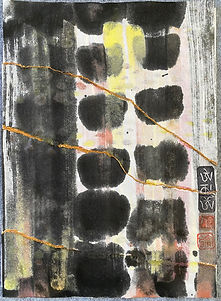CCT Foundation
Level 1 - Course 2
Contemplative Creative Therapy:
Framework, Model and Approach
This course introduces the theoretical and experiential foundations of Contemplative Creative Therapy (CCT), an integrative clinical model at the intersection of Buddhist psychology, contemplative science, and creative arts therapy. Through structured embodied practices and reflective inquiry, CCT supports the gradual training of perception, mindfulness, compassion, and expressive awareness.
Drawing on Indo-Tibetan and Zen Buddhist contemplative traditions, as well as trauma-informed psychotherapy and experiential methods, CCT offers a gradual path of psychological healing, personal insight, and creative transformation. This course introduces the CCT model in clinical application, its theoretical foundations, its embodied training methods, and its practical relevance to psychotherapy.



Course 2 - Overview:
Contemplative Creative Therapy (CCT) emerges at the intersection of Buddhist psychology, contemplative science, and creative arts therapy. It is a multimodal clinical framework designed to train the embodied mind through perception, mindfulness, compassion, and expressive awareness.
Drawing on the contemplative traditions of Indo-Tibetan and Zen Buddhism, as well as modern trauma-informed care, CCT invites both clients and clinicians on a gradual and experiential path of psychological healing, personal insight, and creative transformation.
Purpose of the Course
This course provides an in-depth exploration of the Contemplative Creative Therapy (CCT) model as a clinical, educational, and contemplative framework. Building on foundational contemplative principles introduced in Course 1, Course 2 introduces the theoretical structure, embodied applications, and gradual developmental logic of the CCT model. Rooted in Buddhist psychology, contemplative creative science, and phenomenological inquiry, this course equips participants with a coherent and integrative approach to psychological healing, creative transformation, and relational presence.
It is both a theoretical and experiential immersion into the inner workings of the CCT approach, its philosophical basis, embodied mind training, and practical clinical applications.
Participants will gain insight into:
-
The theoretical and experiential foundations of contemplative creative science (CCS) and CCT
-
How to apply Abhidharma models and phenomenological methods in a contemplative clinical context
-
The four phases and eight levels of the CCT model as a path of embodied healing and transformation
-
How to facilitate embodied awareness through creative expression, somatic inquiry, and contemplative presence
-
How to assess, plan, and guide clients through individualized psychoeducational and therapeutic processes
-
Symbolic closure and ritual integration in therapy endings
-
The application of CCT across diverse modalities and therapeutic needs
Designed For:
This course is intended for psychotherapists, art therapists, mindfulness facilitators, somatic practitioners, educators, and mental health professionals who are interested in integrating Buddhist psychology, contemplative science, and creative expression into their clinical or teaching practice. It is also relevant for contemplative practitioners seeking to bridge personal insight with professional application.
While prior experience with meditation or creative arts therapy is not required, familiarity with basic contemplative or therapeutic frameworks is recommended.
